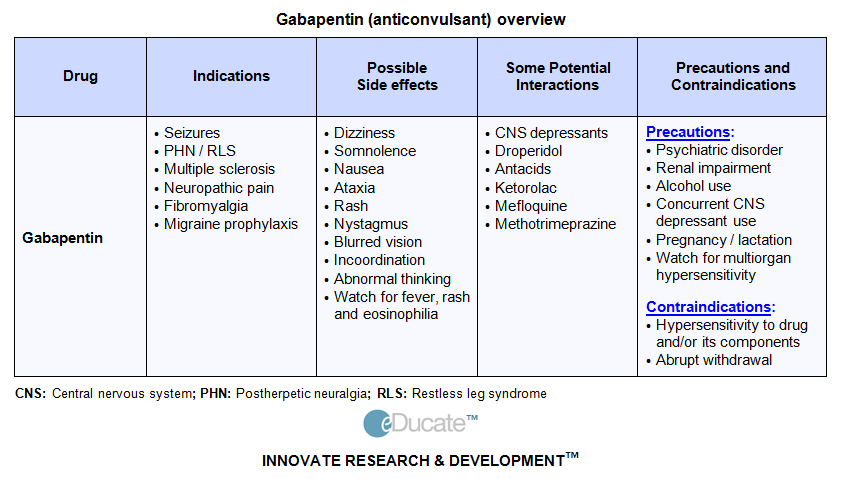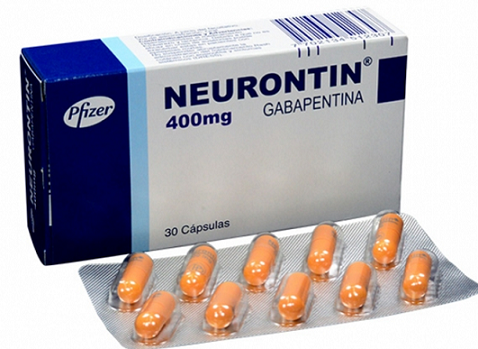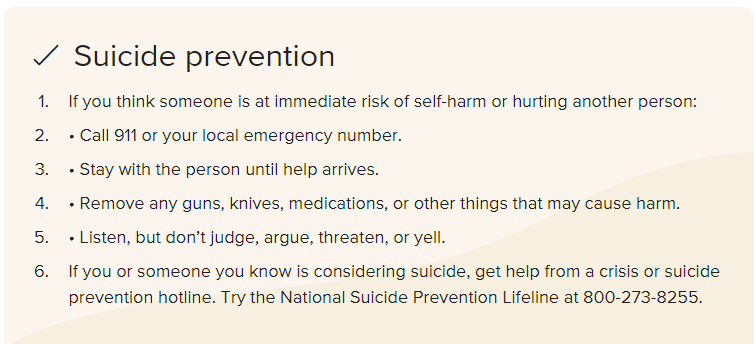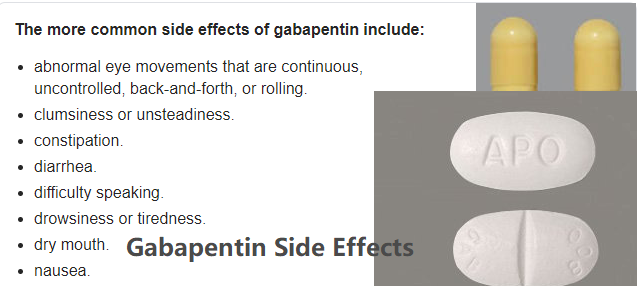Do not stop taking NEURONTIN without first talking to your healthcare provider. Stopping NEURONTIN suddenly can cause serious problems.
Before taking gabapentin,
- tell your doctor and pharmacist if you are allergic to gabapentin, any other medications, or any of the inactive ingredients in the type of gabapentin you plan to take. Ask your pharmacist for a list of the inactive ingredients.
- you should know that gabapentin is available in different forms that may be prescribed for different uses. Ask your doctor to be sure that you are not taking more than one product that contains gabapentin.
- tell your doctor and pharmacist what prescription and nonprescription medications, vitamins, nutritional supplements, and herbal products you are taking or plan to take. Be sure to mention any of the following: antidepressants; antihistamines; medications for anxiety; medications that make you feel dizzy or drowsy; medications for mental illness; naproxen (Aleve, Anaprox, Naprosyn, others); opioid (narcotic) medications for pain such as hydrocodone (in Hydrocet, in Vicodin, others), morphine (Avinza, Kadian, MSIR, others), or oxycodone OxyContin, in Percocet, in Roxicet, others); sedatives; medications for seizures; sleeping pills, and tranquilizers. Your doctor may need to change the doses of your medications or monitor you carefully for side effects.
- if you are taking antacids such as Maalox or Mylanta, take them at least 2 hours before you take gabapentin tablets, capsules, or solution.
- tell your doctor if you have or have ever had lung or kidney disease. If you will be taking the extended-release tablets, also tell your doctor if you need to sleep during the day and stay awake at night.
- tell your doctor if you are pregnant, plan to become pregnant, or are breast-feeding. If you become pregnant while taking gabapentin, call your doctor.
- if you are having surgery, including dental surgery, tell the doctor or dentist that you are taking gabapentin.
- you should know that this medication may make you drowsy or dizzy, may slow your thinking, and may cause loss of coordination. Do not drive a car or operate machinery until you know how this medication affects you, and your doctor agrees that it is safe for you to begin these activities.
- if you are giving gabapentin to your child, you should know that your child’s behavior and mental abilities may change while he or she is taking gabapentin. Your child may have sudden changes in mood, become hostile or hyperactive, have difficulty concentrating or paying attention, or be drowsy or clumsy. Have your child avoid activities that could be dangerous, such as riding a bicycle, until you know how gabapentin affects him or her.
- remember that alcohol can add to the drowsiness caused by this medication.
- you should know that your mental health may change in unexpected ways and you may become suicidal (thinking about harming or killing yourself or planning or trying to do so) while you are taking gabapentin for the treatment of epilepsy, mental illness, or other conditions. A small number of adults and children 5 years of age and older (about 1 in 500 people) who took anticonvulsants such as gabapentin to treat various conditions during clinical studies became suicidal during their treatment. Some of these people developed suicidal thoughts and behavior as early as one week after they started taking the medication. There is a risk that you may experience changes in your mental health if you take an anticonvulsant medication such as gabapentin, but there may also be a risk that you will experience changes in your mental health if your condition is not treated. You and your doctor will decide whether the risks of taking an anticonvulsant medication are greater than the risks of not taking the medication. You, your family, or your caregiver should call your doctor right away if you experience any of the following symptoms: panic attacks; agitation or restlessness; new or worsening irritability, anxiety, or depression; acting on dangerous impulses; difficulty falling or staying asleep; aggressive, angry, or violent behavior; mania (frenzied, abnormally excited mood); talking or thinking about wanting to hurt yourself or end your life; withdrawing from friends and family; preoccupation with death and dying; giving away prized possessions; or any other unusual changes in behavior or mood. Be sure that your family or caregiver knows which symptoms may be serious so they can call the doctor if you are unable to seek treatment on your own.

NEURONTIN can cause serious side effects including:
1. Suicidal Thoughts. Like other antiepileptic drugs, NEURONTIN may cause suicidal thoughts or actions in a very small number of people, about 1 in 500.
Call a healthcare provider right away if you have any of these symptoms, especially if they are new, worse, or worry you:
-
-
- thoughts about suicide or dying
- attempts to commit suicide
- new or worse depression
- new or worse anxiety
- feeling agitated or restless
- panic attacks
- trouble sleeping (insomnia)
- new or worse irritability
- acting aggressive, being angry, or violent
- acting on dangerous impulses
- an extreme increase in activity and talking (mania)
- other unusual changes in behavior or mood
How can I watch for early symptoms of suicidal thoughts and actions?
-
-
- Pay attention to any changes, especially sudden changes, in mood, behaviors, thoughts, or feelings.
- Keep all follow-up visits with your healthcare provider as scheduled.
Call your healthcare provider between visits as needed, especially if you are worried about symptoms.
Do not stop taking NEURONTIN without first talking to a healthcare provider.
-
-
- Stopping NEURONTIN suddenly can cause serious problems. Stopping a seizure medicine suddenly in a patient who has epilepsy can cause seizures that will not stop (status epilepticus).
- Suicidal thoughts or actions can be caused by things other than medicines. If you have suicidal thoughts or actions, your healthcare provider may check for other causes.
2. Changes in behavior and thinking –Using NEURONTIN in children 3 to 12 years of age can cause emotional changes, aggressive behavior, problems with concentration, restlessness, changes in school performance, and hyperactivity.
3. NEURONTIN may cause serious or life-threatening allergic reactions that may affect your skin or other parts of your body such as your liver or blood cells.
This may cause you to be hospitalized or to stop NEURONTIN. You may or may not have a rash with an allergic reaction caused by NEURONTIN. Call a healthcare provider right away if you have any of the following symptoms:
-
-
- skin rash
- hives
- difficulty breathing
- fever
- swollen glands that do not go away
- swelling of your face, lips, throat, or tongue
- yellowing of your skin or of the whites of the eyes
- unusual bruising or bleeding
- severe fatigue or weakness
- unexpected muscle pain
- frequent infections
These symptoms may be the first signs of a serious reaction. A healthcare provider should examine you to decide if you should continue taking NEURONTIN.

Before taking gabapentin,
- tell your doctor and pharmacist if you are allergic to gabapentin, any other medications, or any of the inactive ingredients in the type of gabapentin you plan to take. Ask your pharmacist for a list of the inactive ingredients.
- you should know that gabapentin is available in different forms that may be prescribed for different uses. Ask your doctor to be sure that you are not taking more than one product that contains gabapentin.
- tell your doctor and pharmacist what prescription and nonprescription medications, vitamins, nutritional supplements, and herbal products you are taking or plan to take. Be sure to mention any of the following: hydrocodone (in Hydrocet, in Vicodin, others), medications that make you feel dizzy or drowsy, morphine (Avinza, Kadian, MSIR, others), and naproxen (Aleve, Anaprox, Naprosyn, others). Your doctor may need to change the doses of your medications or monitor you carefully for side effects.
- if you are taking antacids such as Maalox or Mylanta, take them at least 2 hours before you take gabapentin tablets, capsules, or solution.
- tell your doctor if you have or have ever had kidney disease. If you will be taking the extended-release tablets, also tell your doctor if you need to sleep during the day and stay awake at night.
- tell your doctor if you are pregnant, plan to become pregnant, or are breast-feeding. If you become pregnant while taking gabapentin, call your doctor.
- if you are having surgery, including dental surgery, tell the doctor or dentist that you are taking gabapentin.
- you should know that this medication may make you drowsy or dizzy, may slow your thinking, and may cause loss of coordination. Do not drive a car or operate machinery until you know how this medication affects you, and your doctor agrees that it is safe for you to begin these activities.
- if you are giving gabapentin to your child, you should know that your child’s behavior and mental abilities may change while he or she is taking gabapentin. Your child may have sudden changes in mood, become hostile or hyperactive, have difficulty concentrating or paying attention, or be drowsy or clumsy. Have your child avoid activities that could be dangerous, such as riding a bicycle, until you know how gabapentin affects him or her.
- remember that alcohol can add to the drowsiness caused by this medication.
- you should know that your mental health may change in unexpected ways and you may become suicidal (thinking about harming or killing yourself or planning or trying to do so) while you are taking gabapentin for the treatment of epilepsy, mental illness, or other conditions. A small number of adults and children 5 years of age and older (about 1 in 500 people) who took anticonvulsants such as gabapentin to treat various conditions during clinical studies became suicidal during their treatment. Some of these people developed suicidal thoughts and behavior as early as one week after they started taking the medication. There is a risk that you may experience changes in your mental health if you take an anticonvulsant medication such as gabapentin, but there may also be a risk that you will experience changes in your mental health if your condition is not treated. You and your doctor will decide whether the risks of taking an anticonvulsant medication are greater than the risks of not taking the medication. You, your family, or your caregiver should call your doctor right away if you experience any of the following symptoms: panic attacks; agitation or restlessness; new or worsening irritability, anxiety, or depression; acting on dangerous impulses; difficulty falling or staying asleep; aggressive, angry, or violent behavior; mania (frenzied, abnormally excited mood); talking or thinking about wanting to hurt yourself or end your life; withdrawing from friends and family; preoccupation with death and dying; giving away prized possessions; or any other unusual changes in behavior or mood. Be sure that your family or caregiver knows which symptoms may be serious so they can call the doctor if you are unable to seek treatment on your own.
Gabapentin warnings
Gabapentin oral capsule comes with several warnings. Call your doctor if you start having more seizures or a different kind of seizure while taking this drug.
Drowsiness warning
Gabapentin can slow your thinking and motor skills and cause drowsiness and dizziness. It’s not known how long these effects last. You should not drive or use heavy machinery while taking this drug until you know how it affects you.
Depression warning
Using this drug increases your risk of suicidal thoughts and behavior. Talk to your doctor if you feel depressed or notice any changes in your mood or behavior. Also talk to your doctor if you are having thoughts of harming yourself, including suicide.
Multiorgan hypersensitivity/DRESS warning
This medication can cause multiorgan hypersensitivity. This is also known as a drug reaction with eosinophilia and systemic symptoms (DRESS). This syndrome can be life-threatening. Call your doctor right away if you have symptoms such as a rash, a fever, or swollen lymph nodes.
Allergy warning
Gabapentin can cause a severe allergic reaction. Symptoms can include:
- trouble breathing
- swelling of your throat or tongue
- hives
- rash
Don’t take this drug again if you have ever had an allergic reaction to it before. Taking it a second time after any allergic reaction to it could be fatal (cause death).
Alcohol interaction warning
Avoid drinking alcohol while taking gabapentin. Gabapentin can cause sleepiness, and drinking alcohol can make you even more sleepy. Alcohol can also make you more likely to feel dizzy and have trouble concentrating.
Warnings for people with certain health conditions
For people with epilepsy: Don’t stop taking gabapentin suddenly. Doing this can increase your risk of having a condition called status epilepticus. This is a medical emergency during which short or long seizures occur for 30 minutes or more.
Gabapentin can cause problems in children aged 3–12 years who have epilepsy. It raises their risk of thought problems as well as behavioral problems, such as being hyper and acting hostile or restless.
For people with kidney problems: Your body processes this drug more slowly than normal. This may cause the drug to increase to dangerous levels in your body. Talk to your doctor about whether this drug is safe for you.
Warnings for other groups
For pregnant women: The use of gabapentin has not been studied in humans during pregnancy. Research in animals has shown negative effects to the fetus when the mother takes the drug. However, animal studies don’t always predict the way humans would respond.
Talk to your doctor if you’re pregnant or planning to become pregnant. This drug should only be used if the potential benefit justifies the potential risk to the fetus. Call your doctor if you become pregnant while taking this drug.
If your doctor prescribes gabapentin for you while you’re pregnant, ask about the NAAED Pregnancy Registry. This registry tracks the effects of anti-seizure drugs on pregnancy. Information can be found at aedpregnancyregistry.org.
For women who are breastfeeding: Gabapentin may pass into breast milk and cause serious side effects in a breastfeeding child. Tell your doctor if you are breastfeeding. You should decide together if you should stop taking this drug or stop breastfeeding.
For seniors: Kidney function may decrease with age. You may process this drug more slowly than younger people. Your doctor may start you on a lowered dose so that too much of this drug does not build up in your body. Too much of the drug in your body can be dangerous.
For children: Gabapentin has not been studied in children for the management of postherpetic neuralgia. It should not be used in people younger than 18 years. This drug should not be used to treat partial seizures in children younger than 3 years.








